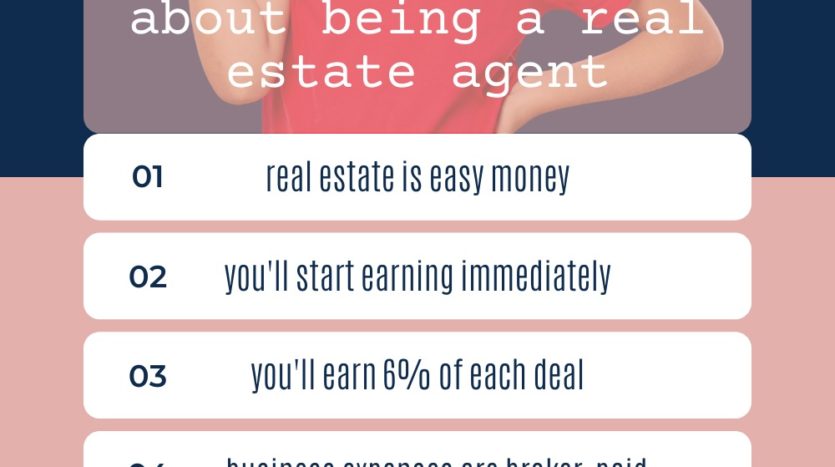Today, we’re debunking the top 10 myths about being a real estate agent.
Whether you’re just starting to think about a career in real estate or you’re in the early stages and wondering if your experience is “normal,” our list is going to give you some serious insight into the daily life of being an agent.
Top 10 Myths About Being a Real Estate Agent
Here are the top 10 myths about being a real estate agent (and the facts!).

Myth #1. Real Estate is Easy Money
This one has to top our list of the biggest myths about being a real estate agent because it’s just so prevalent. But, if real estate were easy money, why would so many agents leave the industry within the first two years of practicing real estate?
The truth is real estate agents are hard workers. The agents that last are the agents who are dedicated to their clients and their business, not the agents looking for easy money.
Look, we get it. From the outside, real estate looks easy. Spend a few hours hanging out with buyers, showing them awesome homes, then collect a fat commission check. Nothing to it! But there is so, so much more going on behind the scenes. We’ll get into more detail on the specific tasks in a bit, but for now, rest assured, this is not an easy gig.
The Solution: Be prepared to work.
Myth #2. You’ll Be Able to Start Earning Immediately
In actuality, even if you sold a home on your very first day as a real estate agent, it would be at least 30-60 days before you would get your commission check because that’s how long it takes to go from contract to close in most cases.
But, what are the chances of selling a home on your first day? Honestly, it could be weeks or even months before you land your first clients. Then probably weeks or months working with your clients. Then 30-60 days to close the deal (assuming the deal proceeds as planned, which isn’t always the case).
The Solution: You need money to cover living expenses while you establish your new business. Here are a few ways agents make ends meet while waiting for the commission checks to start rolling in:
- Rely on a partner’s salary for a few months (if you’re fortunate enough to have that option).
- Save enough to cover living expenses for three to six months while you start your new career (again, great if you’re in a position to make that work, but not everyone is).
- Work a “day job” while establishing your real estate career. This might not be ideal, but there are several things you can do to be a successful part-time real estate agent.
- Build multiple income streams into your real estate business so you start earning money more quickly and diversify your real estate income.
Myth #3. Real Estate Agents Get 6% of Each Deal
This long-standing myth about being a real estate agent is wrong in so many ways! First, real estate commissions are negotiable by law. So the cut won’t always be 6%. Second, that money is immediately split between the seller’s side and the buyer’s side (almost always split 50/50). Third, you split your cut with your broker (based on your pre-arranged commission split).
So, even if the commission is 6%, your side of the deal only gets 3%. And once your broker takes their cut, you might be down to just 1.5% of the sales price. And then you pay taxes, insurance, and other expenses out of that before you arrive at your take-home pay.
The Solution: Ok, look. Even if you only get 1.5%, that can be a good chunk of cash. On a $400,000 home, that comes to $6,000. If you sell one home per month at that rate, you’d gross $72,000 per year. Even after paying taxes, insurance, and business expenses, that’s not bad!
But there are a few things you can do to boost your percentages:
- If you represent both the buyer and seller, you double your income. This is called dual agency. Some states don’t allow dual agency because of the potential conflict of interest when representing both parties in negotiations. But if your state allows this practice, it’s an option.
- Negotiate with your broker for a higher commission split. 50/50 is common for new agents, but maybe you can convince them to give you 60/40. The more you produce, the more willing brokers are to give you a higher cut.
- Don’t discount your rates. While commissions are negotiable between sellers and listing agents, you should almost never agree to reduce your rate below the standard for your area. Part of your job as an agent is to negotiate on behalf of your clients. How good a negotiator can you be if you can’t even get the better of the negotiation for your own rates?
Myth #4. All Business Expenses are Paid by Your Broker
This is only a half-myth. In most cases, some business expenses will be paid by your broker. They might pay some advertising costs, office space overhead, training expenses, etc. But you will definitely have expenses you must cover yourself.
The biggest expense you’ll incur will likely be marketing. While your broker markets listings and the brokerage in general, you need to be out there marketing yourself to prospective buyers and sellers.
The Solution: First, choose your broker carefully. Make sure you ask which expenses they cover when you interview brokers. Then, watch your expenses. You can’t avoid expenses, but you can make sure you’re spending wisely. Track the number of leads you get from each of your marketing campaigns so you can see where you get the biggest bang for your buck. And take advantage of free (or nearly free) marketing methods like social media marketing and blogging for organic leads.
Myth #5. You Can Work Whenever You Want
One of the biggest perks of being a real estate agent is the flexibility. Rather than working 9-5, you get to decide when you’ll work.
But, really, your work schedule depends more on your clients’ schedules than your schedule. If your buyers can only look at homes on weekends, you’ll need to show homes on weekends to have a chance at finding them a home. If your prospective sellers are in an office all day, you’ll need to meet with them in the evening to give them your listing presentation.
And you need to be available to respond to new leads and client questions within a reasonable timeframe.
The Solution: Set reasonable expectations for your clients. Let them know when you check messages and when they can expect a response. Let them know your availability (but be flexible if you can). You can also invest in automated answering services or virtual assistants to field incoming inquiries when you’re not available.
Myth #6. Your Days Are Spent Showing Homes
This is another half-truth. Sure, you’ll spend a lot of time showing homes. And some of them will be awesome!
But the reason this makes our list of the top myths about being a real estate agent is because there’s so much more to the job than showing homes. Here’s a list of other tasks agents regularly manage. Far more of your time will go to these activities than to actually showing homes:
- Responding to new leads
- Responding to client questions
- Working with escrow officers, lenders, title reps, inspectors, and appraisers to keep a deal on track to close
- Creating marketing materials (unless you subscribe to a service that creates fresh marketing materials for you each month – shameless plug for our monthly DRIP service, starting at just $9/month!)
- Posting to social media
- Scanning social media so you can leave relevant feedback for potential buyers and sellers
- Updating your CRM
- Handling your business accounting
- Processing contracts and disclosures
- Developing marketing plans
- Creating CMAs
- Preparing listing presentations
- Data entry (entering new listings into the MLS, etc)
- Staging homes
- Hosting open houses
- Negotiating deals
- Searching for suitable homes for buyers
- Reviewing the hot sheets to keep up with changing market conditions
- Updating clients on the status of their deals
- Updating prospects on market changes and new listings
- Drafting and submitting offers for your buyers
- Reviewing offers for your sellers
- Guiding clients through the contracts, disclosures, and other docs
- Etc, etc, etc.
Myth #7. Your Broker’s Website Will Give You Enough Online Exposure
Fact: your broker’s website promotes the brokerage, not you. Yes, you probably have a profile page on your broker’s site. That page will show up in search results if someone Googles your name. But what if someone Googles “moving to [your city]”? Your profile page certainly won’t show up in those results. Your broker’s site might not even show up.
The way you show up in these search results is to have your own website, where you regularly post information related to your prospects’ searches. Yep, blogging. Blogging gives search engines like Google content to index on your site. It shows that your site is active and relevant. So when your buyers and sellers search for real estate topics online, Google can find the information on your site and recommend your site to users. So then your site can get to work for you, generating leads 24/7. Check out our guide to blogging for real estate leads.
Added bonus for new agents: having a website gives you instant credibility. Today’s buyers and sellers (particularly younger generations) need to see a website as proof that your business is legit. Without a website, they’re far less likely to trust you.
The Solution: You need your own website. As a small business owner, there’s no way around it. You have a few options for getting a website:
- Hire a web designer. Ideal if you can afford it, but as you can imagine, this service is expensive.
- Hire me! I’m not a web designer, but I have built around a dozen sites, so I am confident that I can build you a professional website. And since you’ll maintain full ownership over the site, you don’t have to pay monthly service fees in perpetuity! I’ll even give you a user’s guide so you can make changes on your site instead of paying someone every time you want to make a change. You can learn more about my sites and place your order directly through my Etsy shop (payment plans are even available through Etsy’s affiliate!).
- Pay a monthly fee for a cookie-cutter site. Placester, for example, offers sites for as low as $64/month (as of 2022), while providers like BoomTown charge several hundred dollars per month. Expect to pay a setup fee in addition to these monthly fees.
- Build your own site. Crazy, I know. That’s what I thought before I built my first site. But if every blogger out there can do it, so can you. You just need a guide to help you move through each step as quickly and efficiently as possible. And I have it for you! Here’s your FREE guide to building a real estate website.
Myth #8. Your Pre-License Real Estate Course is the Only Education You Need
Your state-required pre-license course will teach you most of the legal stuff you need to know about being a real estate agent: basic real estate principles and practices, contracts, fiduciary duties, licensing requirements, etc. By the way, if you haven’t chosen a real estate school yet, check out Aceable. As a real estate content writer, I regularly review real estate schools, and Aceable is consistently on top in terms of client satisfaction and affordability. If Aceable isn’t available in your state, Real Estate Express is a close runner-up for the best online real estate schools.
But the course won’t teach you how to be an effective salesperson. You need to learn how to find leads, how to nurture them, how to serve your clients, how to earn referrals, etc., etc., etc. You’ll need to seek out that information on your own.
Oh, and to maintain your real estate license, you’ll also need to take continuing education courses every so often (requirements vary by state). These courses typically cover legal updates, but you might also get “elective” options for topics like social media marketing, finance, or investing.
The Solution: Get ready to soak up a whole world of new knowledge outside of your pre-license course! The good news is that, as a real estate agent, you’ll probably find this new knowledge fascinating. More good news: there are tons of sources available.
Key Real Estate Resources has lots of great info for new agents.
You can also check out free podcasts or pick up a few books to teach you how to be a successful agent.
Myth #9. All Brokers are the Same
Every brokerage has its own practices, training opportunities, rules, and vibes. You could go with a recognizable nationwide franchise or a locally-owned family operation. A tech-forward online brokerage or a traditional brick and mortar. A well-organized brokerage with a structured training program or a hands-off brokerage that provides you with complete anonymity.
The Solution: You just need to find a brokerage that works for you. Take the time to interview multiple brokers. And remember, you’re not interviewing for a job when you meet with brokers. You’re interviewing them to see what they can do for you.
Myth #10. You Need to Be Extroverted to Be Successful
To round out our list of myths about being a real estate agent, we need to address the extroverts-only myth.
When you picture a real estate agent, do you imagine a social butterfly who enjoys meeting everyone and can spend hours chatting about anything? Honestly, being social helps. After all, real estate is about building relationships. So you need to have an interest in meeting people and getting to know them to be successful.
But you don’t need to be an extrovert to be a successful agent. There are so many ways to run a successful real estate business. Extroverts might excel working in volume, meeting lots of people and closing lots of deals. But introverts might prefer to build deep relationships with a smaller number of people.
The Solution: If you’re an introvert, you might focus on the luxury niche, where you can earn more on each transaction, so you can make a good living with a smaller client base. Or maybe focus on investors who buy and sell properties regularly, so you get multiple transactions out of one relationship.

The Bottom Line
There are lots of misconceptions about being a real estate agent. By being aware of these myths about being a real estate agent and learning the facts, you can set yourself up for a more successful real estate career!










